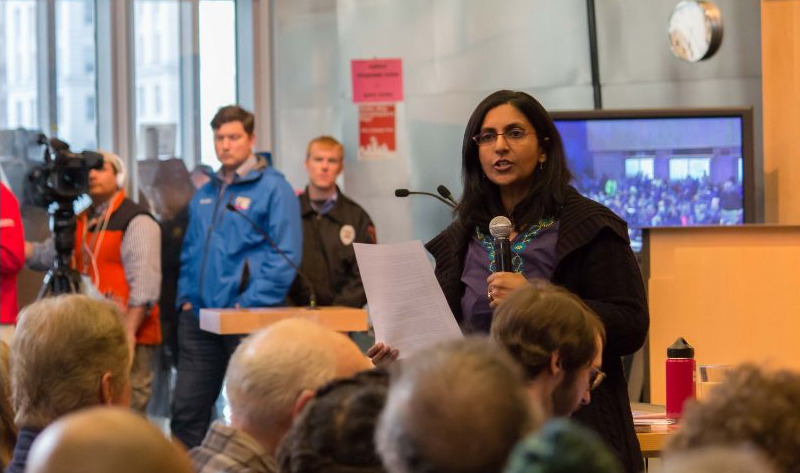
On Wednesday, 9/16, a King County Superior Court judge will hold a hearing on whether to certify the recall petition against Councilmember Kshama Sawant.
At this point we should be familiar with how this process works, since it’s following the same process as the petition to recall Mayor Durkan. A petition with a statement of charges was submitted to King County, then the King County Prosecutor took it and wrote a ballot synopsis for the statement of charges. That synopsis was submitted to the court, which then must determine whether to certify the charges and whether the ballot synopsis should be rewritten.
Superior Court Judge Jim Rogers won’t weigh whether the charges are true or not; instead he will be determining whether the facts alleged, if true, would be sufficient to establish the charges; and whether the charges (if true) are legally sufficient to establish that Sawant “has committed some act or acts of malfeasance or misfeasance while in office, or who has violated his [or her] oath of office,” the requirement for the recall of an elected official as stated in the Washington State Constitution. Rogers will certify any charges that he finds to be factually and legally sufficient, and rewrite the ballot synopsis as needed to pare it down to just those charges.
The ballot synopsis, as submitted to the court, states:
Shall City of Seattle Councilmember Kshama Sawant be recalled from office for misfeasance, malfeasance, and violation of the oath of office based on charges that she violated the city charter, city code and state law when she:
- Delegated city employment decisions to a political organization outside city government.
- Used city resources to support a ballot initiative and failed to comply with public disclosure requirements related such support.
- Disregarded state orders related to COVID-19 and endangered the safety of city workers and other individuals by admitting hundreds of people into city hall on June 9, 2020, when it was closed to the public.
- Used her official position to encourage attendees at a June 28, 2020 rally to illegally occupy the Seattle Police Department East Precinct when the city was trying to de-escalate violence in the area.
- Led a protest march to Mayor Jenny Durkan’s private residence, the location of which Sawant knows is protected under state confidentiality laws.
- Encouraged protestors to occupy the Seattle Police Department East Precinct and helped create the Capitol Hill Occupation Protest (CHOP) Zone which turned into a violent criminal environment that negatively impacted local businesses and residents.
On Friday lawyers for both the petitioner, Ernest Lou, and Sawant filed briefs with the court arguing respectively in support and opposition to the petition. However, in his brief Lou now says that he is dropping charges 4 and 6, the ones related to Sawant allegedly encouraging the occupation of the SPD East Precinct and the creation of the CHOP. For her part, Sawant argues that the petition does not meet factual and legal sufficiency and should be dismissed in its entirety (here is her declaration and exhibits). Sawant’s brief was filed Friday afternoon shortly before Lou’s, which also included a declaration with exhibits to support the charges.
Charge 1 stems from the SCC Insight report in January of 2019 documenting the extent to which Socialist Alternative controls Sawant’s Council office, including the hiring and firing of staff on the city payroll. Charge 2 relates to campaign finance law violation charges against Sawant earlier this year, first reported by SCC Insight. Charge 3 relates to a widely-reported event this past summer when Sawant used her passkey to admit hundreds of protesters into a closed City Hall after hours for a political rally. Charge 5 is from another widely-reported event wherein Sawant spoke at a protest march outside the home of Mayor Durkan, whose address is kept confidential due to threats against the safety of her and her family from her past work as a U.S. attorney.
The Stranger reported on Thursday that the recall campaign is largely being funded by small anonymous donations, though Sawant’s 2019 election opponent Egan Orion has provided a mailing list to the campaign. Meanwhile, Capitol Hill Seattle Blog reports that Sawant is organizing a “solidarity rally” outside the courthouse Wednesday morning before the hearing (because judges love it when you organize rallies to put political pressure on them).
A final note: Sawant has requested that the city pay for her legal expenses to defend against the recall petition. An ordinance will be introduced this coming week to authorize it. The ordinance cites a similar ordinance in 2011 that authorized the city to pay for the legal defense of Sawant’s predecessor, Richard Conlin, against a recall petition. State law allows elected officials to request such an arrangement, and states: “If the legislative authority of the local governmental entity, or the local governmental entity using a procedure created by ordinance or resolution, finds that the acts or omissions of the officer, employee, or volunteer were, or in good faith purported to be, within the scope of his or her official duties, the request shall be granted.” According to a spokesperson in the Mayor’s Office, Mayor Durkan is currently paying her own legal expenses for defending against the effort to recall her.
Sawant is once again being represented by Dmitri Iglitzin, a local labor law attorney who has also represented the Tax Amazon campaign this year and whom Sawant trotted out at a press conference in May to argue against Gov. Inslee’s emergency order restricting the actions of local legislatures.
This article originally appeared in SCC Insight, a local blog that covers Seattle city hall.
